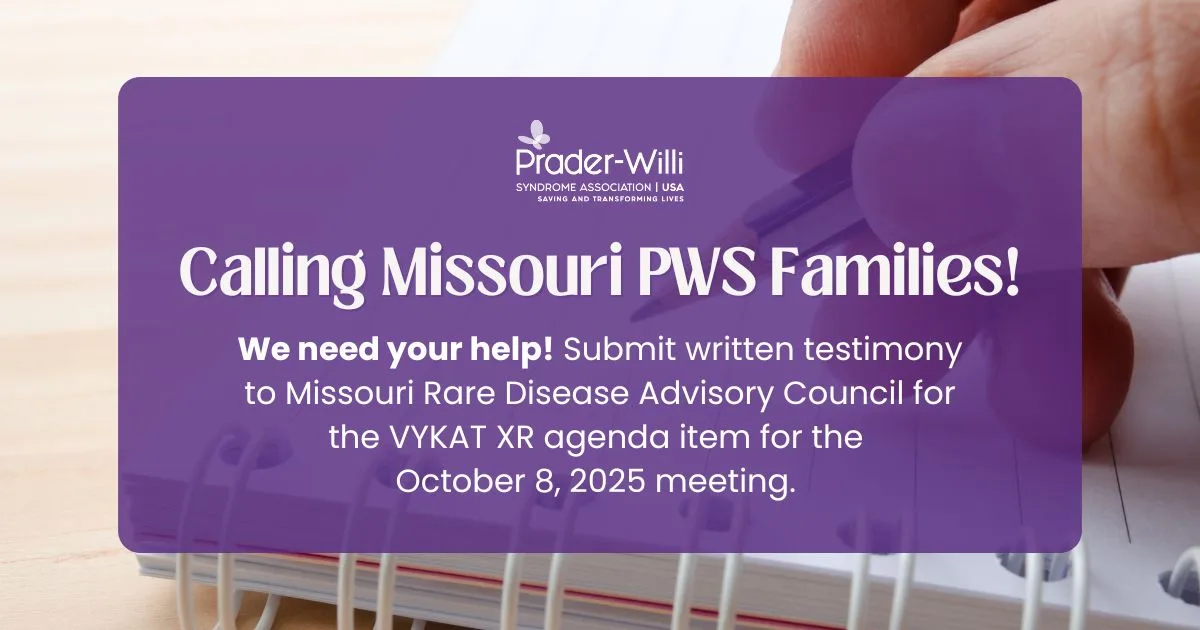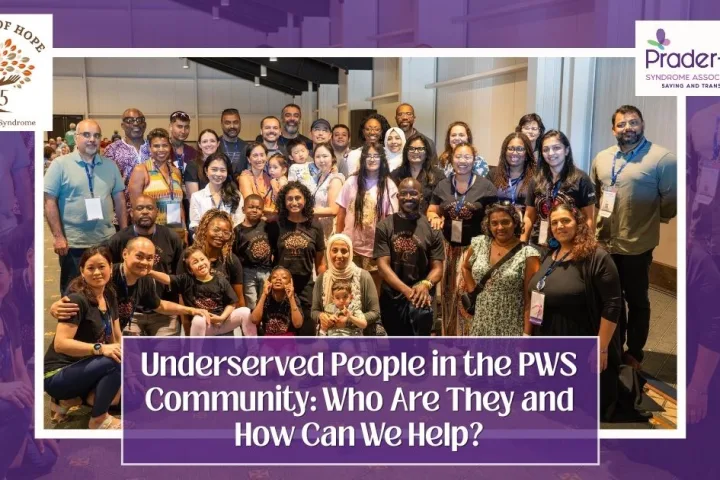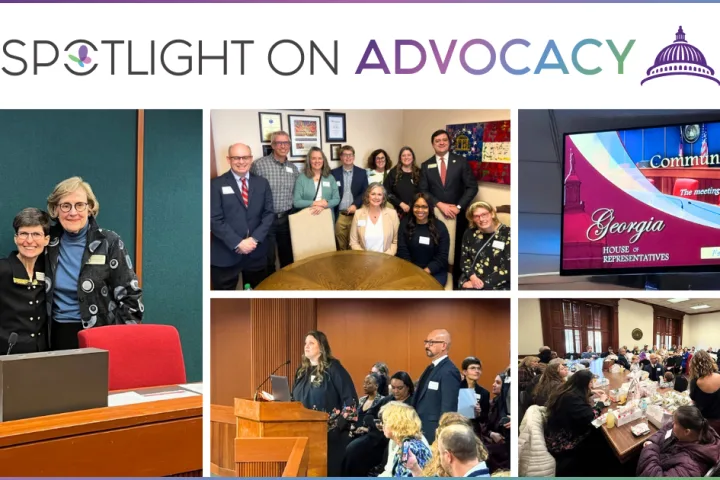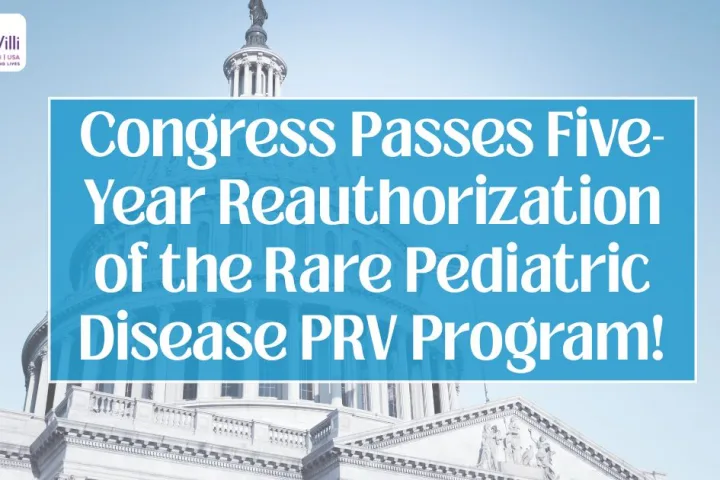The Missouri Rare Disease Advisory Council Meeting will be meeting October 8, 2025 from 10:30 AM – 2 PM CDT.
Here’s how you can help:
The Missouri Rare Disease Advisory Council needs to hear directly from you – the parents, caregivers, and family members who understand the real-life impact of hyperphagia (excessive hunger) in PWS. One of the medications under review is Vykat XR, the first-ever hyperphagia treatment specifically for individuals living with PWS that was approved by the FDA in March 2025.
We’re asking families to submit written testimony to help decision-makers understand why access to this treatment is so urgently needed.
Submission Details:
- Max TWO Pages
- May include photo
- Medicare/Medicaid/Medicaid Waiver recipients are favored
Meeting Details:
- When: Wednesday, October 8th
- Time: 10:30a – 2:00p CT
- Meeting Agenda: Agenda
ALL MEMBERS OF THE GENERAL PUBLIC CAN ACCESS THE MEETING AS FOLLOWS:
Virtual option:
Any member of the public may register for public comment. Any interested party shall be granted the opportunity for clinically relevant public comment for up to three (3) minutes per medication under review by the RDAC. The responsibility of scheduling the presentation shall rest with the interested party, and registration must be completed prior to the scheduled meeting. Registration for public comment may be found through the meeting link: https://mydss.mo.gov/mhd/rdac/meetings
The drug utilization review board shall seek the input of the advisory council on rare diseases and personalized medicine to address topics for consultation under this section including, but not limited to:
1. Rare diseases;
2. The severity of rare diseases;
3. The unmet medical need associated with rare diseases;
4. The impact of particular coverage, cost-sharing, tiering, utilization management, prior authorization, medication therapy management, or other Medicaid policies on access to rare disease therapies;
5. An assessment of the benefits and risks of therapies to treat rare diseases;
6. The impact of particular coverage, cost-sharing, tiering, utilization management, prior authorization, medication therapy management, or other Medicaid policies on patients’ adherence to the treatment regimen prescribed or otherwise recommended by their physicians;
7. Whether beneficiaries who need treatment from or a consultation with a rare disease specialist have adequate access and, if not, what factors are causing the limited access; and
8. The demographics and the clinical description of patient populations.
9. Nothing in this section shall be construed to create a legal right for a consultation on any matter or to require the drug utilization review board to meet with any particular expert or stakeholder.
10. Recommendations of the advisory council on rare diseases and personalized medicine on an applicable treatment of a rare disease shall be explained in writing to members of the drug utilization review board during public hearings.
11. For purposes of this section, a “rare disease drug” shall mean a drug used to treat a rare medical condition, defined as any disease or condition that affects fewer than two hundred thousand persons in the United States, such as cystic fibrosis, hemophilia, and multiple myeloma.
12. All members of the advisory council on rare diseases and personalized medicine shall annually sign a conflict-of-interest statement revealing economic or other relationships with entities that could influence a member’s decisions, and at least twenty percent of the advisory council members shall not have a conflict of interest with respect to any insurer, pharmaceutical benefits manager, or pharmaceutical manufacturer.
Website:
Missouri Revisor of Statutes – Revised Statutes of Missouri, RSMo Section 208.183
Writing Guide:
· My name is:
· I live in:
· My child living with PWS is ___ old and receives Medicaid in the state of MO.
· Thank the members of the committee for the work they do.
· How do the unmet needs of PWS affect your family?
· If your son/daughter IS taking vykat XR, explain how access to the drug has changed your lives?
· If your son/daughter IS NOT taking vykat XR, how will having access to an approved drug to treat hyperphagia in PWS change their lives and what their future looks like?
· What is your hope for the approval of drugs to treat hyperphagia in PWS?
Review:
If you’d like help drafting your story or want someone to review it with you, PWSA | USA is here to support you. Reach out to a fellow parent or contact us directly (info@pwsausa.org or 941.312.0400).
Remember, the experts will cover the science; your testimony will touch the hearts of the decision-makers. Bring them to tears with the reality of our challenges and the promise of what could be. This is where the power is.
Share this!





 Perry A. Zirkel has written more than 1,500 publications on various aspects of school law, with an emphasis on legal issues in special education. He writes a regular column for NAESP’s Principal magazine and NASP’s Communiqué newsletter, and he did so previously for Phi Delta Kappan and Teaching Exceptional Children.
Perry A. Zirkel has written more than 1,500 publications on various aspects of school law, with an emphasis on legal issues in special education. He writes a regular column for NAESP’s Principal magazine and NASP’s Communiqué newsletter, and he did so previously for Phi Delta Kappan and Teaching Exceptional Children. Jennifer Bolander has been serving as a Special Education Specialist for PWSA (USA) since October of 2015. She is a graduate of John Carroll University and lives in Ohio with her husband Brad and daughters Kate (17), and Sophia (13) who was born with PWS.
Jennifer Bolander has been serving as a Special Education Specialist for PWSA (USA) since October of 2015. She is a graduate of John Carroll University and lives in Ohio with her husband Brad and daughters Kate (17), and Sophia (13) who was born with PWS. Dr. Amy McTighe is the PWS Program Manager and Inpatient Teacher at the Center for Prader-Willi Syndrome at the Children’s Institute of Pittsburgh. She graduated from Duquesne University receiving her Bachelor’s and Master’s degree in Education with a focus on elementary education, special education, and language arts.
Dr. Amy McTighe is the PWS Program Manager and Inpatient Teacher at the Center for Prader-Willi Syndrome at the Children’s Institute of Pittsburgh. She graduated from Duquesne University receiving her Bachelor’s and Master’s degree in Education with a focus on elementary education, special education, and language arts. Evan has worked with the Prader-Willi Syndrome Association (USA) since 2007 primarily as a Crisis Intervention and Family Support Counselor. Evans works with parents and schools to foster strong collaborative relationships and appropriate educational environments for students with PWS.
Evan has worked with the Prader-Willi Syndrome Association (USA) since 2007 primarily as a Crisis Intervention and Family Support Counselor. Evans works with parents and schools to foster strong collaborative relationships and appropriate educational environments for students with PWS. Staci Zimmerman works for Prader-Willi Syndrome Association of Colorado as an Individualized Education Program (IEP) consultant. Staci collaborates with the PWS multi-disciplinary clinic at the Children’s Hospital in Denver supporting families and school districts around the United States with their child’s Individual Educational Plan.
Staci Zimmerman works for Prader-Willi Syndrome Association of Colorado as an Individualized Education Program (IEP) consultant. Staci collaborates with the PWS multi-disciplinary clinic at the Children’s Hospital in Denver supporting families and school districts around the United States with their child’s Individual Educational Plan. Founded in 2001, SDLC is a non-profit legal services organization dedicated to protecting and advancing the legal rights of people with disabilities throughout the South. It partners with the Southern Poverty Law Center, Protection and Advocacy (P&A) programs, Legal Services Corporations (LSC) and disability organizations on major, systemic disability rights issues involving the Individuals with Disabilities Education Act (IDEA), Americans with Disabilities Act (ADA), and the federal Medicaid Act. Recently in November 2014, Jim retired.
Founded in 2001, SDLC is a non-profit legal services organization dedicated to protecting and advancing the legal rights of people with disabilities throughout the South. It partners with the Southern Poverty Law Center, Protection and Advocacy (P&A) programs, Legal Services Corporations (LSC) and disability organizations on major, systemic disability rights issues involving the Individuals with Disabilities Education Act (IDEA), Americans with Disabilities Act (ADA), and the federal Medicaid Act. Recently in November 2014, Jim retired.